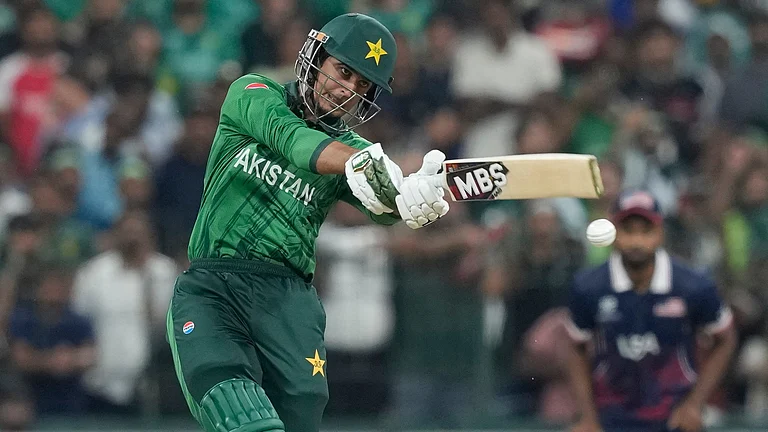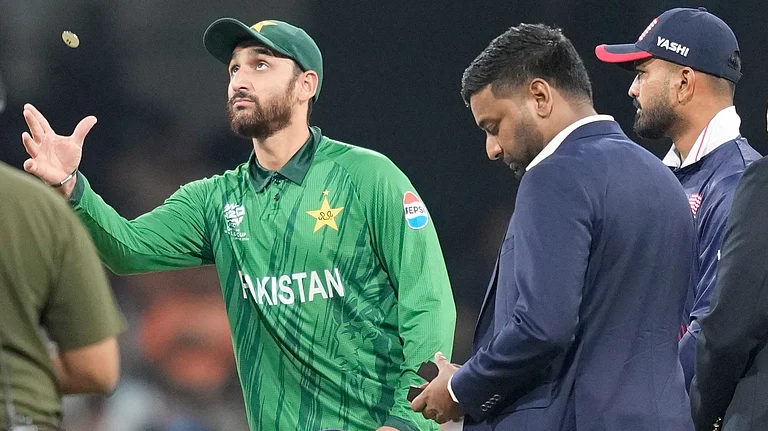Article 19(1)(c) of the Indian constitution though provides the citizens with the freedom to peacefully congregate and protest, for the newly admitted students of South Asian University, it is no more a delegated right.
The SAARC-sponsored University has asked the new batch of students to sign an undertaking that reads, “I hereby declare that I will neither join in any agitation/ strike for the purpose of forcing the authorities of the University to resolve any problem”. The undertaking in its clause 9 also asks the students to declare that they are “not suffering from any serious/contagious ailment and/or any psychiatric/psychological disorder”.
One of the newly admitted students, on the condition of anonymity, says, “The protest is our democratic right and depriving us of it is tantamount to the violation of the basic tenets of the constitution.” However, the university in its response to Outlook says, "Nothing in the General Declaration/Undertaking signed by the newly admitted students may be construed as prejudicing in any manner the SAARC intergovernmental agreement, Rules, Regulation and By-Laws."
The students, however, point out that it is a deliberate attempt by the University to muzzle their voices in the backdrop of the long-term protests that recently resulted in the expulsion of three students and the rustication of two.
Students Protests for Stipend
Since its foundation through the collaboration of SAARC countries in 2010, South Asian University has been deep-necked into several controversies. However, the latest spell started in October 2022, when the student protests flared up to contest the alleged slashing of stipends for the Master's students. While earlier the Master's students used to get a monthly stipend of Rs. 5000, it was allegedly reduced to Rs. 4000. On October 10, they submitted a memorandum to the university president listing their demands.
One of the expelled students anonymously says, “The demands were not only related to the stipend. It was one of the many. The other demands were related to the paid extension of PhD scholars whose research got affected due to Covid and the fair elections of two bodies- students’ grievance redressal cell and the sexual harassment committee.” While the UGC gave a blanket extension to the Covid-affected research scholars, the SAU was dealing with it on a case-to-case basis, they add.
The discontent among the students, however, was brewing since April 2022 when a biotech student was allegedly harassed by her supervisor. Further, within days a mathematics scholar even got disappeared- again due to the actions of his supervisor. “All of these coupled with the absence of grievance redressal mechanism left the students with no option but to protest,” says another student.
The situation went out of hand on October 13 when the students mostly from the M.A. courses gheraoed the president and asked him to respond. “The authority called the police in the night within the campus. We had no intention to create a nuisance, we just wanted a decent response”, says one of the students who was present at the protest site. The authority ultimately agreed to hear the students on October 17. “That day, around 400 students were present. They individually presented their cases in front of university authorities. But nothing came up,” they add.
One of the students from a marginalised community even requested the authority to increase the stipend to Rs. 7000 citing his financial situation but allegedly nobody paid heed to it. Sources inform that he asked for a bit of relaxation on the stringent attendance rule so that he could go and work to support his family. “His father was not well and he was also into depression. Still, his requests went in vain,” adds another student.
Not only the students from the marginalised communities but students from other SAARC countries like Bangladesh, Bhutan or Afghanistan were also suffering due to the meagre scholarship. While talking about the significance of such stipends for foreign students, one of the former student activists Shubham Sharma says, “It was 2017. I went to an Afghan restaurant and found that one of our students was working as a waiter. On being asked, he told me that he had to leave his studies due to his less CGPA which deprived him of the required scholarship. I came back to the campus and found several foreign students suffering due to it. We started a movement to exclude CGPA as the criterion to disburse scholarships and ultimately, we won and the students got back to their classes.”
The foreign students were also disproportionately affected due to their inaccessibility to Junior Research Fellowship (JRF) that is available to Indian students. “We even fought for it and asked the authorities to increase the stipends of the doctoral scholars to maintain parity,” Sharma notes.
Since 2017, nothing changed much, claims a student.
The Order of Expulsion
It was on October 31, 2022, that the students became restless and they decided to occupy the administrative floor breaking the tradition of showing protest at the entrance gate. “There was some small altercation with the security guards. However, it was nothing big. We just wanted to make ourselves visible to the President as we were not getting any response”, a student anonymously notes.
However, a few had to pay the cost of the altercation. On November 4, five students received an expulsion notice. Without citing any specific reason, it notes, “You have been inconsistently involved in act of indiscipline.” On being asked why did they pick the five students out of so many, one of the expelled students says, “We still don’t know why we had been picked. One of us had a verbal spat with the president, the other read poetry on October 13. And for the rest, we have no clue.”
Another reason behind such action, the student claims, was due to the replacement of the proctor. “Until November 3, the proctor was someone from the Economics department. He didn’t want to sign the expulsion order. But they replaced him with someone from the mathematics department who signed it,” they add.
The protests again gathered strength and the expelled students started an indefinite hunger strike when they were asked to leave the hostel premises. On the night of November 22, one of the expelled students who belong to a marginalised community collapsed and was immediately taken to the University healthcare where he suffered a stroke and a paralysis.
“On the very next day, we, around 100 students went to the registrar’s office and asked him to immediately revoke the expulsion order and he did so around 3.25 pm. But he imposed certain conditions for revocation. We continued to sit in his office and said that for the student who was hospitalised, the revocation should be unconditional,” the expelled student notes. That night the police also came to the registrar’s office and asked him to accept the demands.
On November 25, the hospitalised student came out of danger. “As I informed the authority about the development, within hours, I along with another few students received expulsion notice. This time the notice came with a 15 days’ time to appeal to the high-powered committee.” It was comprised of the Proctor as its Chairperson and Deans of the Faculties of Economics, Life Sciences and Biotechnology Mathematics and Computer Science and Social Sciences as its members. “However, the Dean of law was not included as he was sympathetic to our cause,” another expelled student adds.
They submitted their responses several times and presented their case in front of the committee till February 15, 2023, when they received the final expulsion notice. “Actually, when the campus was in Chanakyapuri, they couldn’t throw us from the campus and hostel but as it shifted to Maidangarh, we were not allowed inside,” he says. Another expelled student started camping outside the new campus.
During this time, in the first week of February, they knocked on the doors of the Delhi HC saying that the decision to expel them was not only arbitrary, it violated the natural principle of justice. The matter is currently sub-judice. “The major question that has become a point of contention in the court is whether the case of SAU comes within the ambit of Indian jurisprudence.”
Sources have informed us that a few students again have submitted letters to the university requesting the revocation of the expulsion. But the counsel of the university told the court that they would not accept anything less than an unconditional apology.
Penal Action Against Faculties
The penal action, nonetheless, has not only affected the students but four faculties who showed sympathy to them had also been suspended. “We only sent a mail to the university community in October saying that the police forces within the campus could have been avoided through an amicable solution. We again shot a mail when the student got hospitalised due to drug overdose. We wanted to enquire what pushed the student who was already psychologically disturbed, to such a situation,” says an expelled faculty member, on the condition of anonymity.
On December 30, five faculty members received show cause notice and were asked to present their case in front of a high-powered fact-finding committee. “The committee was formed in March, we were called in May,” he adds. Meanwhile one of the faculty members apologised to the authority and the case against him had been revoked.
However, when they presented themselves in front of the fact-finding committee, they were asked to respond to more than 200 questions in writing, notably, within hours. “We told them that it is impossible and we need legal opinion for responding to them as some of them even contained legal intricacy. However, they were adamant and asked us to do it immediately. We asked for two months’ time,” the faculty notes.
On June 16, they received the suspension notice under regulation 38. “One must notice that the SAU constitution doesn’t have any clarity on the rules and regulations of suspension. Though it says that the President has the power to suspend, there is no specific rule,” adds the expelled faculty. The faculties have also filed a writ petition to the Delhi HC and the matter is now sub-judice.
Science-Social Science Cleavage?
Some students think that the whole issue stemmed from two contexts- firstly, the failure of the administration and secondly, the cleavage between science and social science faculties. One of the students says, “Lately the administration became full of science faculties- the acting president is from mathematics, acting vice president from biotechnology and acting registrar from Computer Science. Social Sciences faculties had earlier even objected to it and said that the administration was not paying attention to them.”
Talking about the administrative failure, Prabudh Singh, a scholar and a former student of SAU, says, “The current crisis at South Asian University is a culmination of a long-standing deliberate policy failure and incompetence of the university administration. The university administration gradually started running the university as their personal fiefdoms, and ruined the project completely.”
The reduction of scholarships further worsened the situation. “To give a context, nearly 27 students out of 30 in my Master’s batch used to receive and were completely dependent on one form of scholarship or another. Under the new regime of merit and limited scholarships, the number of students receiving financial support was effectively reduced to half. Every year since, students have continuously faced hardships due to such regressive policy decisions, and thus held protests to make the administration correct their path,” Singh says.
The ongoing protests perhaps gave the backdrop to the undertaking that is now at the centre of controversy. Whereas there is fear among the students, one of them puts it down rightly, “The culture of democracy cannot be wiped away. It has a strong root. The undertaking doesn’t have the capacity to overpower it.”



























